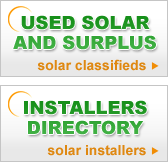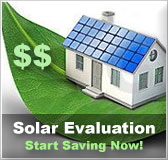
|
Louisiana residential solar energy incentivesPersonal tax credit for solar and wind energy systems on residential property Louisiana provides a tax credit for the purchase and installation of solar and wind energy systems purchased and installed on or after January 1, 2008. The system must be installed at a residence or a residential rental apartment complex to be eligible. Credit may be applied to personal, corporate or franchise taxes. The tax credit may be applied both to solar-electric systems (photovoltaic systems) and solar-thermal systems, when the energy is used for space heating, space cooling or water heating. The amount of the credit is equal to 50% of the first $25,000 of the cost of each system, including installation costs if installed by someone other than the tax payer. The credit must be fully claimed in the taxable year in which the system is installed and placed in service. Any excess credit which exceeds the taxpayer's liabilities for that year will be considered an over payment, and the Louisiana Department of Revenue will issue a refund for the remaining amount within one year of receiving the claim. For photovoltaic (PV) systems, the tax credit applies to AC or DC generation systems which are stand-alone systems, grid-connected or net-metered systems. Solar thermal systems must be used for the main purpose of heating water (including pool heating), space heating or space cooling. Solar thermal equipment must be SRCC-certified and installed with all valid building and plumbing codes. Solar energy system exemption 100 % property tax exemption on solar equipment. Any equipment attached to an owner-occupied residential building or swimming pool as part of a solar energy system is considered personal property that is exempt from ad valorem taxation. Eligible renewable technologies include passive solar space heating,
solar water heating, solar space heating, photovoltaics, and solar
pool heating. Home energy loan program State loan program administered by the Louisiana Department of Natural Resources through the HELP program, allowing homeowners to receive a five-year loan to improve the energy efficiencies of their existing homes. DNR subsidizes 50% of the financing for energy efficiency improvements at a low interest rate. Maximum amount of participation by the DNR is $6000. A homeowner may qualify for an energy improvement loan in two ways : Energy Home Rater makes recommendations through an energy audit. Choose pre-approved home improvements as designated by the HELP program. Net Metering Net Metering allows customers to connect renewable energy systems to the grid for their own use and to supply excess electricity to the electric grid. Residential customer-generated electricity may be from solar, wind, small hydropower, or fuel cell systems of up to 25 kW in size. Net excess generation produced in a one month period is credited
to the customer's next bill indefinitely by the utility. Residential renewable energy tax credit This federal personal tax credit allows the taxpayer to claim a credit of 30% of expenditures including labor costs and installation of qualified residential solar-electric systems, solar water heating systems or fuel cells. Small wind-energy systems and geothermal heat pumps can also be accredited for. Solar-electric systems and solar water heaters have a maximum incentive of $2,000 if placed in service before 2009. There is no maximum incentive for systems placed after 2008. The excess amount of the federal tax credit may be carried forward to the next taxable year if it exceeds tax liability. This can be carried forward until 2016, but after that, it is unknown if the unused credit will be able to be forwarded. Residential energy conservation subsidy exclusion This is a personal exemption of 100% of energy conservation subsidies provided by public utilities. The value of a purchase or installation of any energy conservation measure by a customer such as solar water heat, solar space heat or photovoltaics will not be included in the customer’s gross income. Customers of an electric utility company, who participate in
the utility’s energy conservation program, may receive a rate
reduction of electricity furnished or a nonrefundable credit against
the purchase price of the electricity on each monthly electric bill. Energy-Efficient Mortgages This is a federal loan program where homeowners can use EEM (energy-efficient mortgages) to finance renewable energy technologies in a home.
 |







